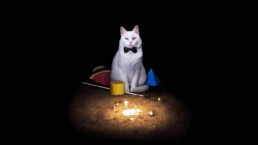‘Koko-di Koko-da’ Review: Trapped in a Twisted Fairy Tale
This is a custom heading element.
Grief is a gravitational force.
That’s the concept behind Johannes Nyholm’s gruesome fairy tale drama Koko-di Koko-da. In this idea-driven surrealist fable, the grief of a married couple bends their experience of time and space so thoroughly that it summons a band of twisted fairytale villains who entrap the pair in a time loop. Fans of surreal, psychological horror will delight in this film’s intellectual heft, cheerfully sadistic villains, and focused emotional center. Although, many may find that the film’s ruthless, psycho-sexual torments make it more of a dark thesis to appreciate than a favorite flick to revisit.
The terror at the heart of Nyholm’s film is a soul-shaking one. It’s the fear of becoming so deadened by depression that you never wake up or fight back, sleeping through seasons and withdrawing into the belief that life will never be vibrant again. This is absolutely how the once happily married Elin and Tobias feel after a tragic event that I won’t spoil, and the supernatural spookiness that descends reflects their inability to escape their own tortured thoughts.
A woodland getaway gets violent
Elin (Ylva Gallon) and Tobias (Leif Edlund) venture into the woods for a healing vacation, but instead are faced with humiliation at the hands of a cheerfully sadistic showman in a white suit. He is the maestro of a woodsy murder crew and his assistants include a gun-wielding woman in a ragged dress, a massive man who loves to body slam, a vicious hound, and the snow-white cat that heralds their approach. They’ve come to torture Elin and Tobias and waste no time massacring the pair.
However, when the torture is finished and Elin and Tobias lay dead, the scene resets so they can be murdered every day in gruesome and undignified ways. Elin and Tobias are clueless as to how to escape but slowly gain awareness that something is wrong. You see, though Koko-di Koko-da has much in common with other time-loop narratives, from Edge of Tomorrow to Russian Doll, its key departure is that the characters don’t retain their memories of the loop. Rather they have a dreamlike sense of unease that increases in clarity with each repetition.
Like the goth Uncle of Groundhog Day
This time-loop premise makes for a smart and eerie journey into the way pain distorts perception. In one of the film’s most unsettling scenes, Elin wakes up alone in the tent and emerges to find wintry snow has set in. As far as we know, this camping trip takes place in the summer. The frightening implication is that the couple will sleep through the rest of their lives, never regaining a healthy engagement with the passage of time. They’ll be frozen in trauma, literally.
However, like most time-loop stories there is the hope of escape from the damaging patterns that hold the characters back. In the small, but strangely excellent little genre of time-loop narratives, it’s common for frustrated characters to examine their life anew, searching for the inflection points where they can make small changes with cascading effects.
Onscreen psycho-sexual abuse will divide audiences
Koko-di Koko-da, in its own warped way, also sees its characters seeking a better life. However, I found the journey didn’t quite fulfill the emotional potential of its premise. Koko-di Koko-da spends so much of its 82 minutes having the leads torn apart by dogs or shot which effectively gets their pain across but gives the capable actors little to do besides whimper. Most troublingly, the time loop always resets on the sexual abuse of the female lead. Sexual assault is held over the male lead as a threat, but never actually shown onscreen.
This is a common double-standard in horror. Many filmmakers seem comfortable showing women being suggestively tortured, but they shy away from being nearly so graphic with male bodies. Now, the sometimes sexual nature of the horror for both characters in Koko-di Koko-da does have a very strong thematic justification and is not meant to be arousing or exploitative, but it crosses a line to a place that many viewers will not want to follow. This element dragged the film down considerably in my estimations, as much as I admired its other ambitions.
Thoughtful horror
On the whole, Koko-di Koko-da is thoughtful horror with an undeniable commitment to expressing emotion visually. It shares so many traits with the best of the horror and time loop genres and earns bonus points for the shadow-puppet animations that appear at key turns in the story. I will never dislike an emotion-centric horror film with animated interludes and a scary cat, but as much as this is, *ahem*, extremely my sh*t, it’s not quite as well-paced, sensitive, or impactful as it could have been. Nevertheless, I hope this isn’t Swedish writer-director Johannes Nyholm’s last trip into the woods, as he clearly grasps what makes a person shiver to their core.
7/10
Koko-di Koko-da has been acquired by U.K. distributor, Picturehouse
Kailee Andrews
Kailee holds a Communication Arts B.A. from the University of Wisconsin. At 21, she programmed her first film festival for an audience of 4,000+ on campus. Since then, it's been all about sharing the cool arts and crafts of cinema.

